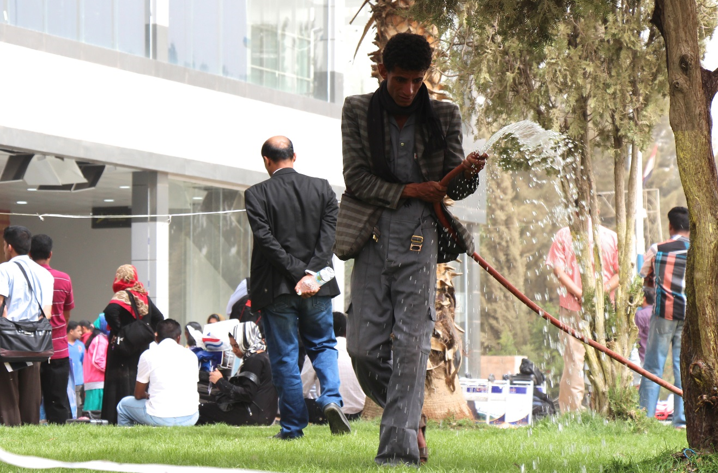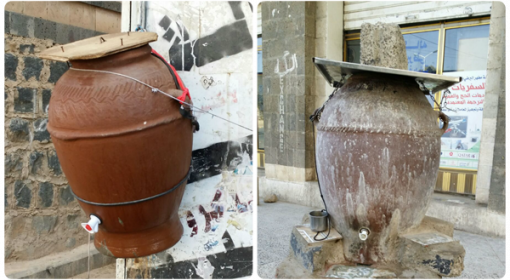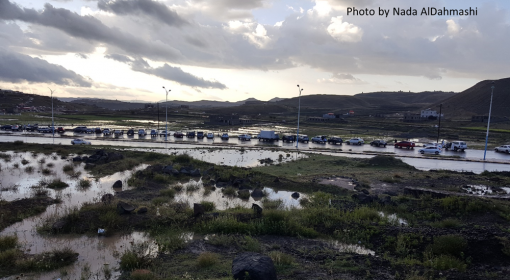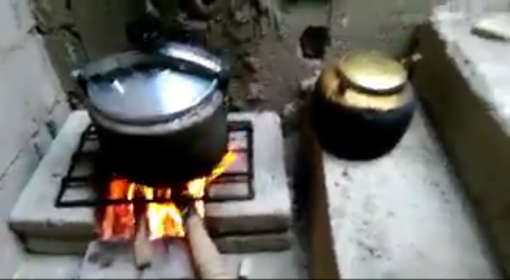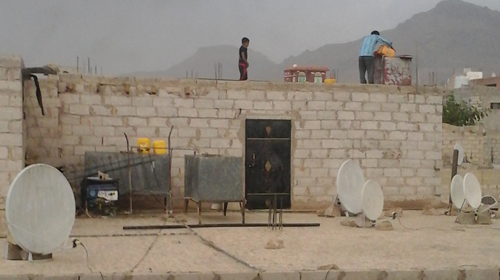By Madiha Al-Junaid (edited by Brett Scot)
June 18, 2015
It is not an uncommon sight: Children, women, the elderly, and a number of men lining up for water in front of public wells or water pumps, carrying their 10 to 20-liter water containers on their heads, with both hands or in a three-wheeled carriage. This is how Sana’a, one of the most water scarce cities in Yemen, has been for as long as I can remember. However, during the festering civil war in Yemen over the past year, and especially since the Saudi-led coalition began airstrikes and a complete blockade, Yemen is under an even more severe water shortage where water reaches houses only once or twice per month. Apart from these rarest of occasions, no government-supplied water is reaching citizens’ houses. This is coupled with an unprecedented rise in the price of privately supplied water, which has witnessed a 50% jump, sometimes even higher.

Kids, the elderly and some women in line to fill in their yellow containers with water to satisfy their daily need (Images: Madiha Al-Junaid)
In such distress, many prefer to wait in lines for long hours to get barely enough water to satisfy their daily household demands, rather than buying expensive water from owners of private water trucks, who get their supply from their private wells.
While shortages of food and medical supplies are proving disastrous, the fuel shortage is believed to be the most troubling, preventing water from reaching public water pipes, and leading to long, if not permanent, electricity blackouts. The situation has been the same for the past two months, and if anything is deteriorating further.
Like most cities in Yemen, Sana’a is a ghost town with very little transportation or signs of life. Furthermore, although over a million are displaced or have fled Yemen fearing the Houthis’ anti-aircraft fire and the intense explosions of the Saudi-led coalition’s airstrikes; the water crisis in Yemen is even under a greater insecurity, presenting a greater humanitarian problem.
The Brighter Side
In a more optimistic view, Yemenis are well known for their quick and impressive ability to adapt to whatever situation they are forced into. Yemenis have lived with water shortages for decades, and therefore, are arguably the best prepared to deal with a very low amount of water. Furthermore, despite fighting in many cities and growing divisions across the country, during the war in Yemen ordinary citizens have on many occasions come together to support their communities.
A number of humanitarian acts demonstrating cooperation, care and concern for fellow citizens has been witnessed in various neighborhoods. A new water-supply strategy was implemented when water was unable to reach houses due to a shortage in diesel, which is used to pump the water and transfer it via the city’s water pipe system. Instead, huge oil tanker trucks with many rubber tubes attached to them were driven through neighborhoods and local residents could fill their water containers for free. Many such tanker trucks were used throughout Sana’a.
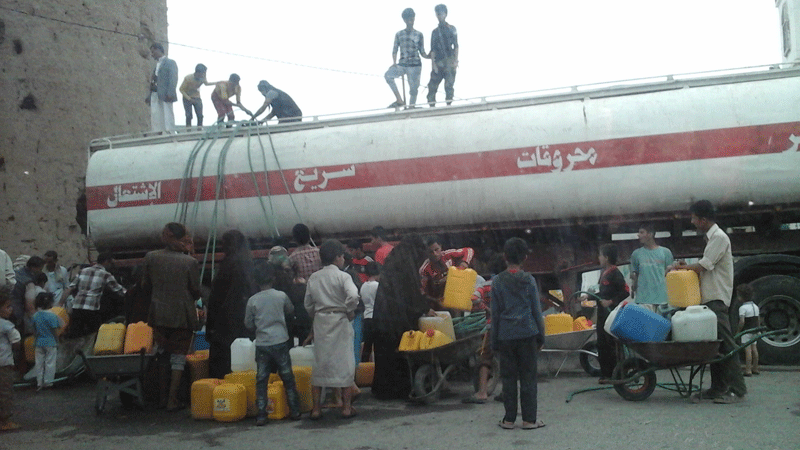
Huge oil tanker trucks with many rubber tubes attached to them were driven through neighborhoods and local residents could fill their water containers for free.
Image: Madiha Al-Junaid
Alternatively, some owners of private wells or philanthropists would pay for a regular private water truck to distribute water freely for poorer residents.
Although Yemeni society is struggling from all sides and facing all kinds of misery, there will always be some light, even if it is as dim as a candle light. It is the same light which has kept Yemeni cities going regardless of the frightening present and the unpromising difficulties, including living with very limited water for more than two months.
To conserve the limited water available under such circumstances, Yemenis are doing their laundry much less frequently. Moreover, people are using less water when showering; a full shower is taken only once in a while. The murky grey water that remains after showering is often reused for some household chores for better water management. The water normally used to irrigate the small trees planted on many main roads is now being preserved and prioritized for human use during this water shortage. Adding insult to injury, there appears to be low rainfall this season, leaving plants to dry up and die.
Misfits
“The airport was controlled by the Houthis, it was pretty much closed. There had been an airstrike very nearby that killed many people, and there was already a big water shortage… And yet this guy was just walking around having a nice time watering the garden,” said Brett Scott, a former managing editor at the Yemen Times who fled Sana’a in April when the situation escalated.
He added that this incident really shocked him and made him think differently, although he thought that he was used to “how crazy things in Yemen can be”.
It is not only the gardener who was observed having no worries of whatever the surrounding circumstances are, but many people in Yemen are… They are so much fitting to be ‘misfits’!
“The airport was controlled by the Houthis, it was pretty much closed. There had been an airstrike very nearby that killed many people,
and there was already a big water shortage…And yet this guy was just walking around having a nice time watering the garden”
Image: Brett Scott
